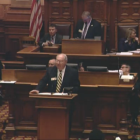
Georgia Juvenile Code Overhaul Clears State House
|
After five years of work, a 243-page overhaul of Georgia's juvenile code passed the state House of Representatives unanimously on Wednesday. The bill -- endorsed by judges, prosecutors, defense lawyers, state agencies and child advocates across Georgia -- now moves to the Georgia Senate. House Bill 641 creates a broad array of programs for neglected children and for children who leave the foster-care system at age 18; strengthens protections for children in juvenile court; clarifies when the state may remove a child from home or seek to terminate parental rights; and adopts best practices from across the country for handling deprivation and delinquency cases. "People will quite often address us as elected House members and say, 'Why do you do that? Why do you run for office?"





